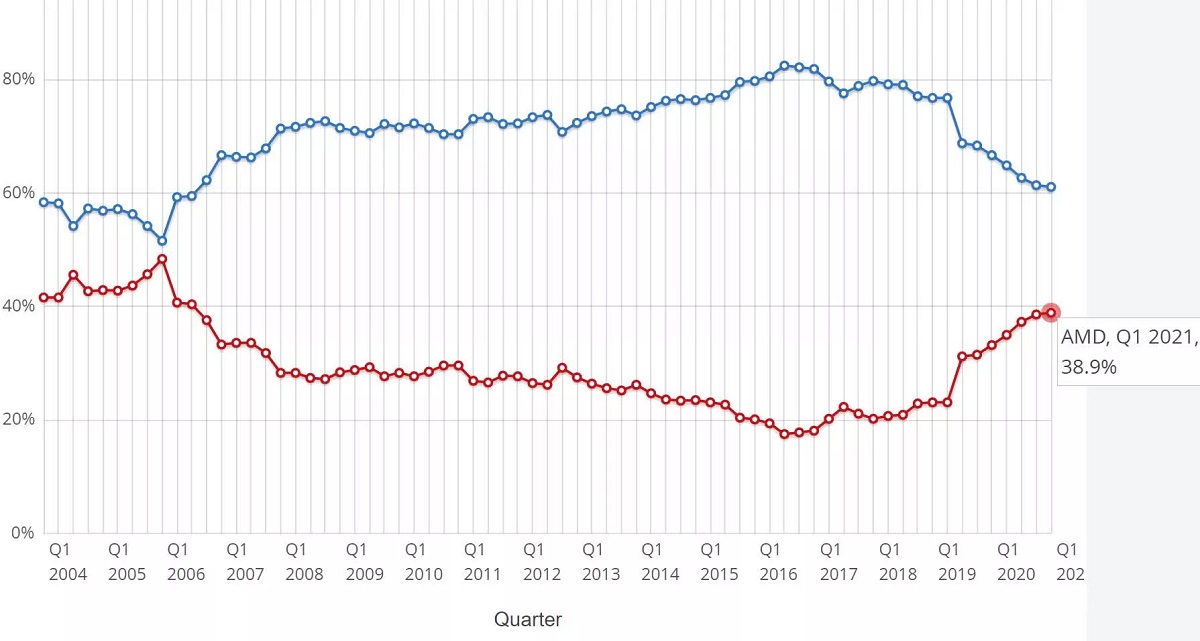
The latest ZEN 3 based AMD Ryzen and Threadripper CPUs have helped AMD surpass Intel in the desktop computing segment. The company has achieved this feat just once and that too about fifteen years ago.
Intel is now the second-largest CPU manufacturer as AMD has crawled past the market leader after nearly fifteen years. The news confirms AMD is growing rapidly, however, it still has a lot more ground to cover in the laptop and server computing segments.
AMD creeps past Intel to become the top desktop CPU supplier but lags in laptop and server space:
Benchmarking giant PassMark Software’s latest results for Q1 2021 indicate AMD has a 50.8 percent share of the worldwide desktop CPU market. As the desktop CPU market is essentially a duopoly, Intel has a 49.2 percent market share.
The last time AMD was ahead of Intel was way back in Q1 2006. Back then, the company had a 53.6 percent market share. However, Intel quickly raced ahead with its Core series of CPUs and grabbed the top position within a single quarter.

Since 2006, Intel has led all the prominent computing segments, be it desktop, laptop, or server. Intel has a healthy 83.8 market share in the laptop computing segment.
It is important to note that for almost 14 years, AMD’s CPUs, be it for the desktop or laptop segment, were considered budget offerings. The processors lacked the high Boost Clock frequencies, which Intel often advertised aggressively.
Moreover, AMD’s processors rarely, if ever, had the Hyper-Threading (HT) or Simultaneous Multi-Threading (SMT). Such a feature essentially allowed a single core to perform two processing operations as if it were two cores.

It was only after the arrival of ZEN Core Architecture that the company has gone through a strong resurgence. The ZEN 2, and the recently introduced ZEN 3 Core Architectures have allowed AMD to race ahead.
Despite the advancements, AMD is still way behind Intel in the server segment as well. The company does offer powerful EPYC server CPUs that boast of 32 and even 64 Cores. However, Intel still has a 98.6 percent market share while AMD has just 1.4 percent.
Will AMD retain its lead or Intel grab the leadership position once again?
Considering all the CPUs, and amalgamating the different markets and the respective market shares, the gap between AMD and Intel is the smallest it has been in 15 years. Both companies are now only 22.2 percent apart.
Incidentally, the CPU duopoly is about to be broken. Microsoft and Apple have successfully introduced ARM. The British semiconductor and software design company has developed CPUs that run software supported by Intel and AMD. Moreover, Apple Inc.’s iOS and Microsoft’s Windows 10 can now run reliably, and in some cases exceptionally well, on ARM processors.

Despite ARM’s confirmed entry in the desktop computing market, Intel doesn’t have to worry about the company. However, it should be concerned about AMD, and Apple Inc. as well.
Ever since AMD launched its Ryzen CPUs, the company has been steadily growing. Incidentally, it also manufactures the recent generation of Ryzen 5000 series of CPUs on a 7nm Fabrication process. Meanwhile, Intel is still sticking to the archaic 14nm Production process.
Intel has had success with the 10nm SuperFin fabrication process. But AMD is already on to the 5nm Production process for the next-generation ZEN 4. While the company could launch 5nm ZEN 4-based Ryzen CPUs later this year, Intel’s upcoming Rocket Lake processors still use a variant of Sunny Cove which is essentially backported to the 14nm process.


